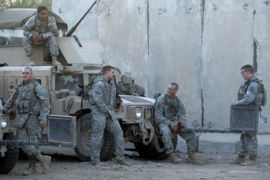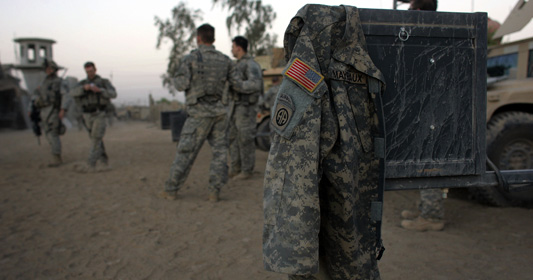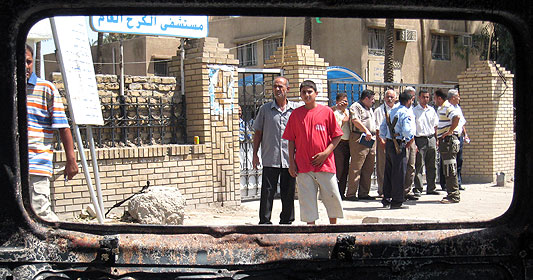Debating the US troop ‘surge’
Al Jazeera analyst Marwan Bishara looks at the Bush administration’s Iraq strategy.

 |
| Petraeus is expected to ask for more time [AFP] |
Following the publication of two damning reports about the situation in Iraq by Congress and the General Accountability Office, the long-awaited Petraeus report is expected to present a cautiously optimistic reading of Iraq‘s security.
Never mind that asking the general to assess the so-called “surge” policy is like asking a student to grade his own exam-paper.
Petraeus’s recent interviews and last week’s letter to US troops underlines his intention to ask for more time, at least until the spring of 2008.
His positive assessment seems to be based on selective reading of three recent developments: a decrease in US military casualties, an increase in pockets of calm and mounting internecine divisions and confrontations between groups in the Anbar province.
|
Special report |
For example, 20 per cent less deaths among the troops in July than in May or June could have been good news for the “surge” if it was not for the 23 per cent increase in the number of Iraqi deaths during the same period.
Considering the “surge’s” central mission is to “protect the local population” in order to pave the way for Iraqi reconciliation, those figures are anything but positive.
Likewise, the US general believes his strategy of “win, hold, and rebuild” is leading to calm in certain Baghdad neighbourhoods and Sunni regions.
But in the long run carrying out house-to-house searches and arrests, like all military operations of proximity humiliates civilians, nourishes hatreds and produces fresh recruits for the organised resistance.
Civilian fatalities
Already the number of Iraqi prisoners has increased from 6,000 in 2004 to 60,000 in 2007 with an increase of 50 per cent in the number of Iraqi prisoners held in US military jails during the “surge”.
Meanwhile torture, killings and ethnic cleansing associated with Al Qaeda fighters, new Sunni militias and pro-government death squads continue to proliferate unabated in the back alleys of other neighbourhoods, villages and cities in the countryside.
|
“Had the US foreign policy makers read history, they would not get involved in any war after Vietnam” Mishmish, Egypt |
According to the most conservative estimates, 2,024 civilians, mostly innocent, were killed in July.
Which leads us to the third pillar of US military optimism; adding a Sunni-Sunni war to the other wars ravaging Iraq is exacerbating an already disastrous humanitarian, social and political situation and complicating all attempts at stabilising major population centres hit by massive civilian displacements.
The multiplication and divisions of organised insurgencies, resistance groups, death squads, criminal gangs and splintering paramilitary groups will, eventually, complicate US counterinsurgency tactics just as inter-Iraqi violence complicates reconstruction, development and reconciliation efforts, the two interdependent pillars of any success in Iraq.
Worse, the arming of Sunni militias as a way out of the mess in Anbar is exacerbating the obvious failure of the central government and the national army.
With time, such decentralisation will lead to the demise of these two guarantors of the unity of Iraq in favour of a disintegrated or failed state.
Unemployment in the country is currently 50 per cent, the population is impoverished, has little or no electricity or running water and one million families are headed by widows, while eight million are dependent on aid.
Iraq is better off with less, not more, violent confrontation regardless of its source.
Ultimately, the logic behind the “surge” was to provide a secure and stable environment that allows for a political reconciliation to succeed.
Lack of progress
That strategy was based on denying resistance groups the sympathy of the disenfranchised members of society, especially among the Sunnis who feel they have been left out of post-invasion Iraq.
These steps, as outlined by Washington, aimed at creating a new law for sharing oil revenues, holding provincial elections, revising Iraq‘s constitution to produce a more centralised state, lifting the ban on public sector employment of former Baathists and fairly distributing reconstruction funds.
Six months on, there are no signs of any real progress in any of those benchmark areas.
Not only did the governing United Iraqi List fail to institute the important legislative and political reforms, its leadership has neither the will nor the desire to share power or wealth with its potential political and sectarian adversaries.
The problem with the Bush’s plan lies not in setting political benchmarks, as conceived by the Baker-Hamilton commission.
Rather, it lies in entrusting their implementation to sectarian Iraqi leaders supported by US military escalation, which is in direct contradiction to the commission’s core recommendations.
 |
| The number of deaths among Iraqis rose in July [AFP] |
